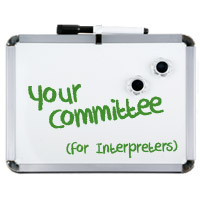
Interpreter 4-1-1: The Importance of Interpreters Knowing Their Own Comfort Zone
Every human being has biases and the ability to predict events is one of the most valuable you can cultivate as an interpreter. As interpreters we have unique access to the lives of our clients. We need to know ourselves and our hidden biases. What content or situations would you not feel comfortable interpreting? What interpreting situations are deal breakers? What steps could you take when you find yourself in these situations?
For example:
- A hearing person yelling at a deaf person.
- A doctor telling a deaf patient that they are terminal.
- An offensive joke.
- A religious or political meeting that goes against your beliefs.
- A history class where the teacher is intolerant to other cultures and races.
- A hearing person talking down to a deaf person and treating them like a lesser person.
- A child abuse case where the abuser acts flippant and casual.
- A client who always brings conversations around to something sexual.
Every person’s comfort level is different. Think about what types of situations would make you uncomfortable and unable to interpret to the best of your ability. Once you have a good understanding of your own comfort zone and limitations, you can do a better job of selecting (and avoiding) the best interpreting jobs to fit both your skill and your personal preference.
What are your interpreting deal breakers and what do you do when one comes up? Share your thoughts in the comments below.
ADVERTISEMENTS
 Brenda Cartwright is a Coda, seasoned interpreter, a master teacher, well known presenter, and author of several best selling sign language and interpreting textbooks from the RID Press. For 35 years Brenda was the Chair of the Sign Language Interpreter Program at Lansing Community College in Lansing, Michigan.
Brenda Cartwright is a Coda, seasoned interpreter, a master teacher, well known presenter, and author of several best selling sign language and interpreting textbooks from the RID Press. For 35 years Brenda was the Chair of the Sign Language Interpreter Program at Lansing Community College in Lansing, Michigan. Interpreter 4-1-1: Your Interpreter Committee
Interpreter 4-1-1: Your Interpreter Committee Interpreter Q & A: Wearing a Brace While Interpreting
Interpreter Q & A: Wearing a Brace While Interpreting Signs That Are Close... But Not the Same - Set 3
Signs That Are Close... But Not the Same - Set 3








Savvy User nadaMonday, January 30, 2017
Can you help me find an article on Deaf individuals who may have or have had a stroke. Do they retain their abitility to sign? And, if not, how do you help them. I am not Deaf, however I sign and since strokes in my family are prevalent, (is that the right word?), I wonder if I have a stroke will i still be able to sign and make what I need or want to say known? Thank you for any help you can give. i may not have worded this correctly, but perhaps you understand. God bless you for this site, nada